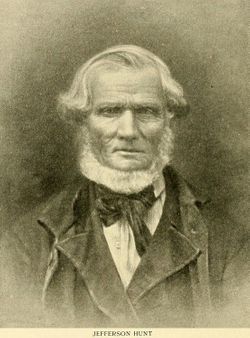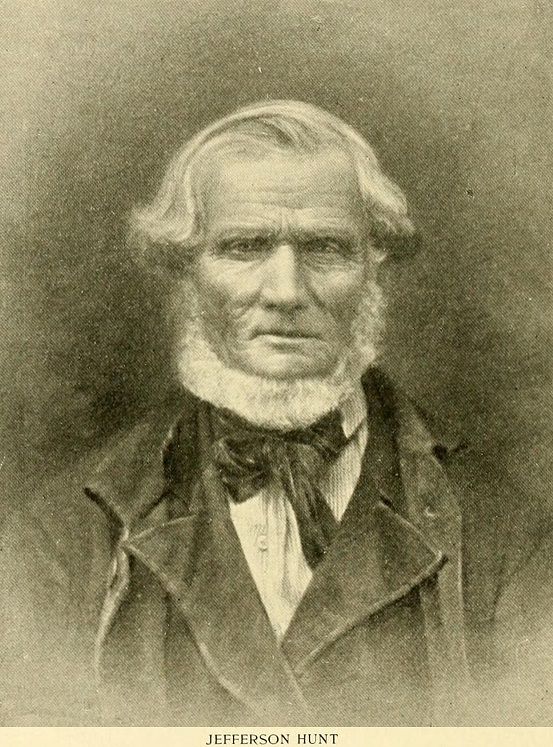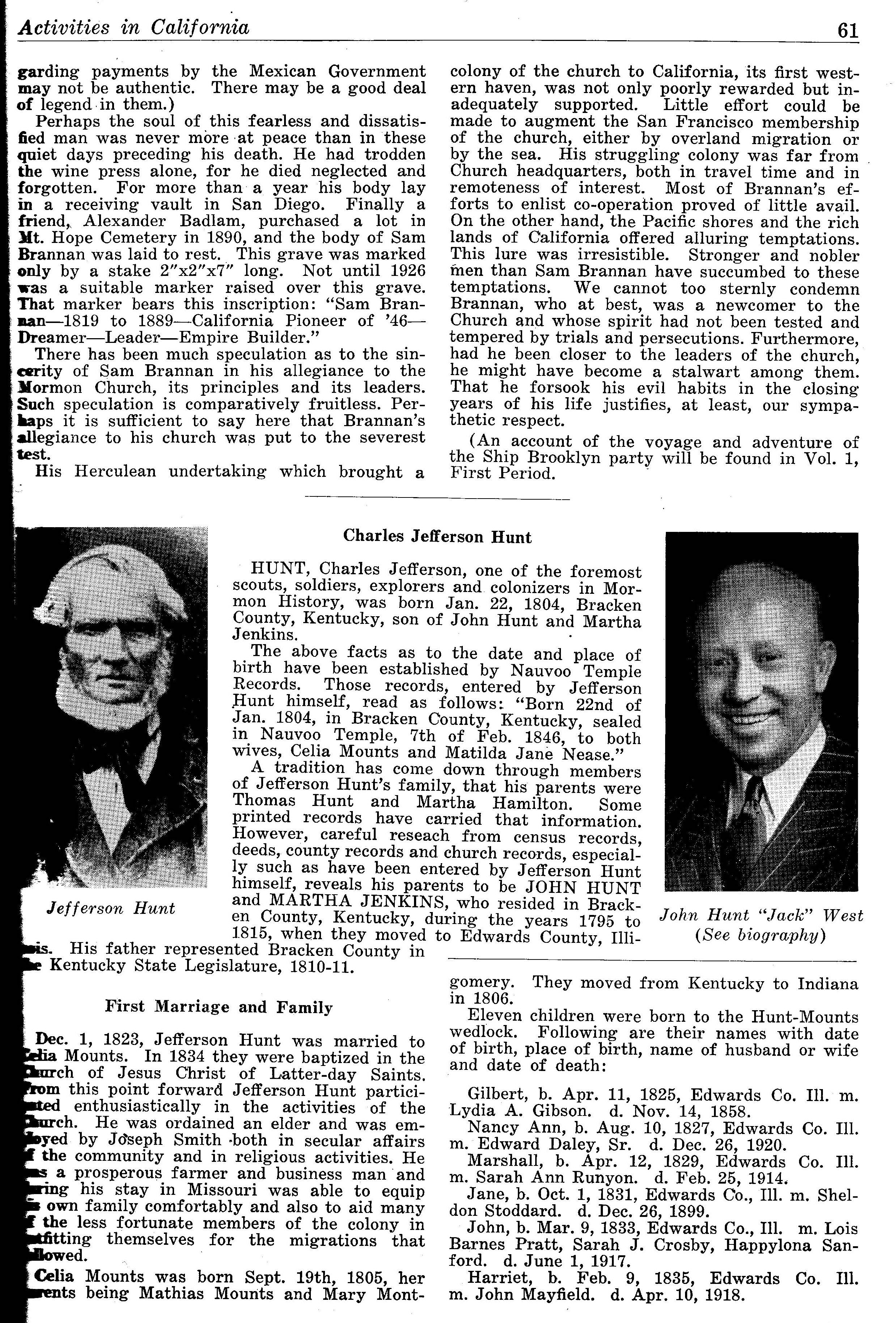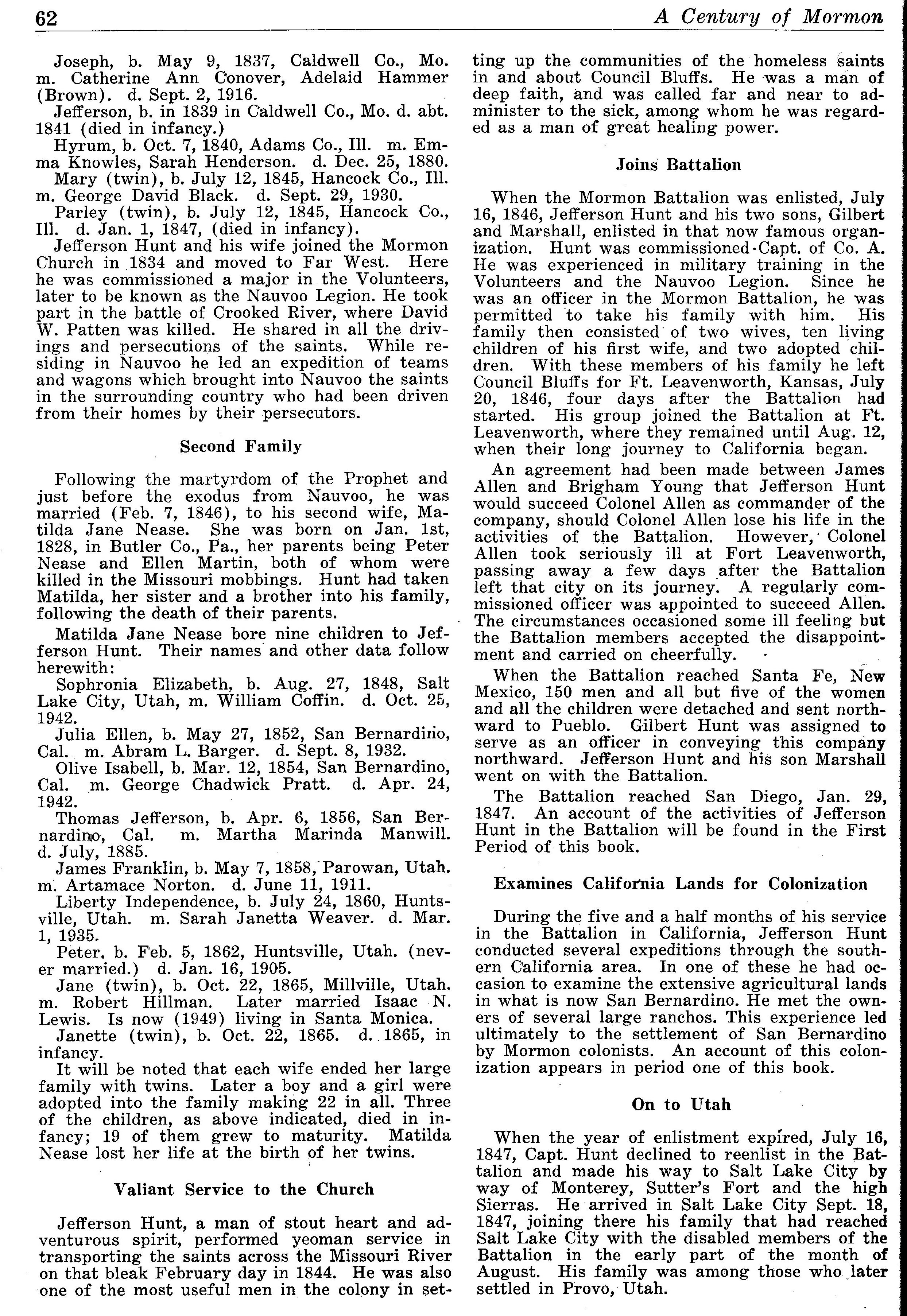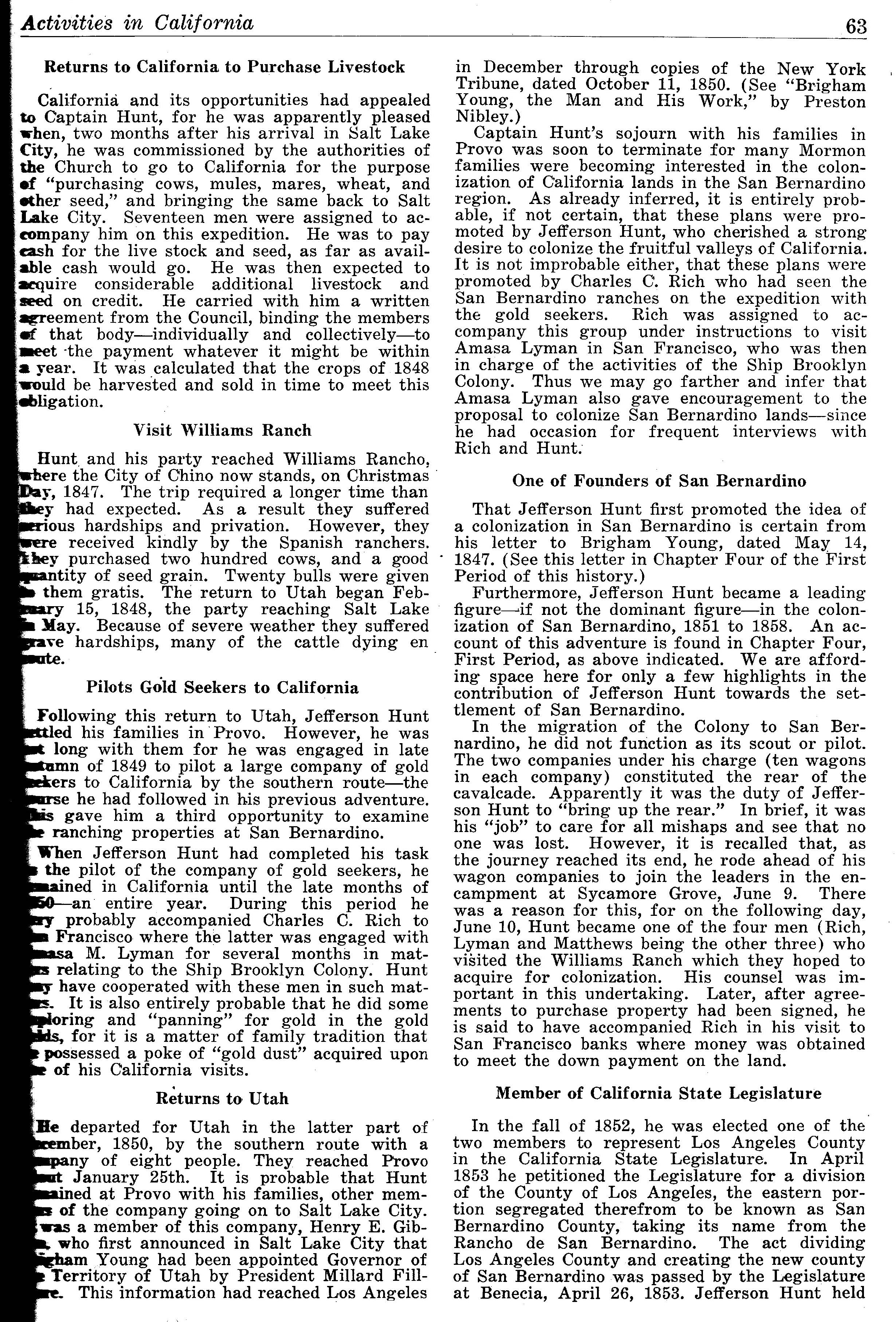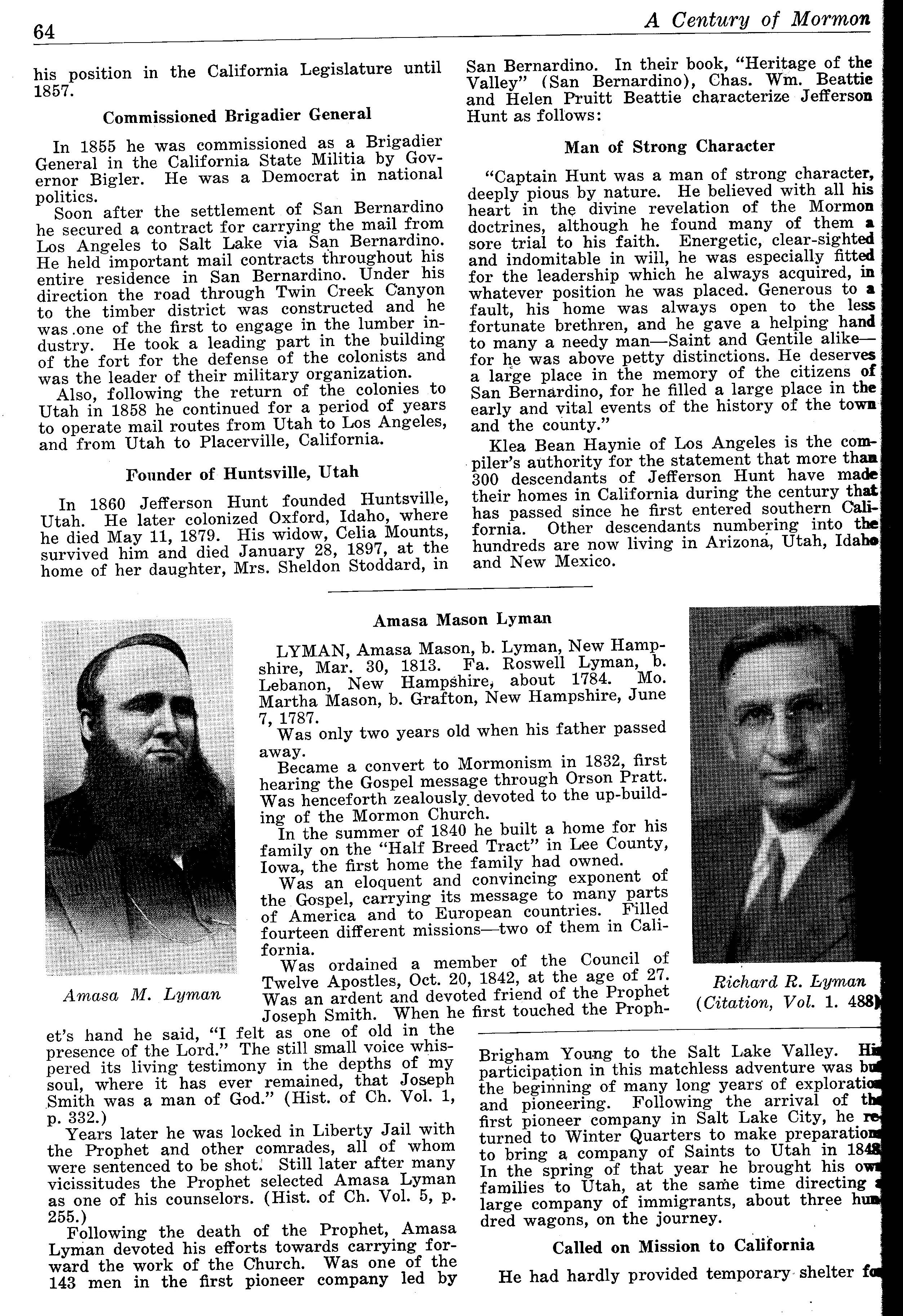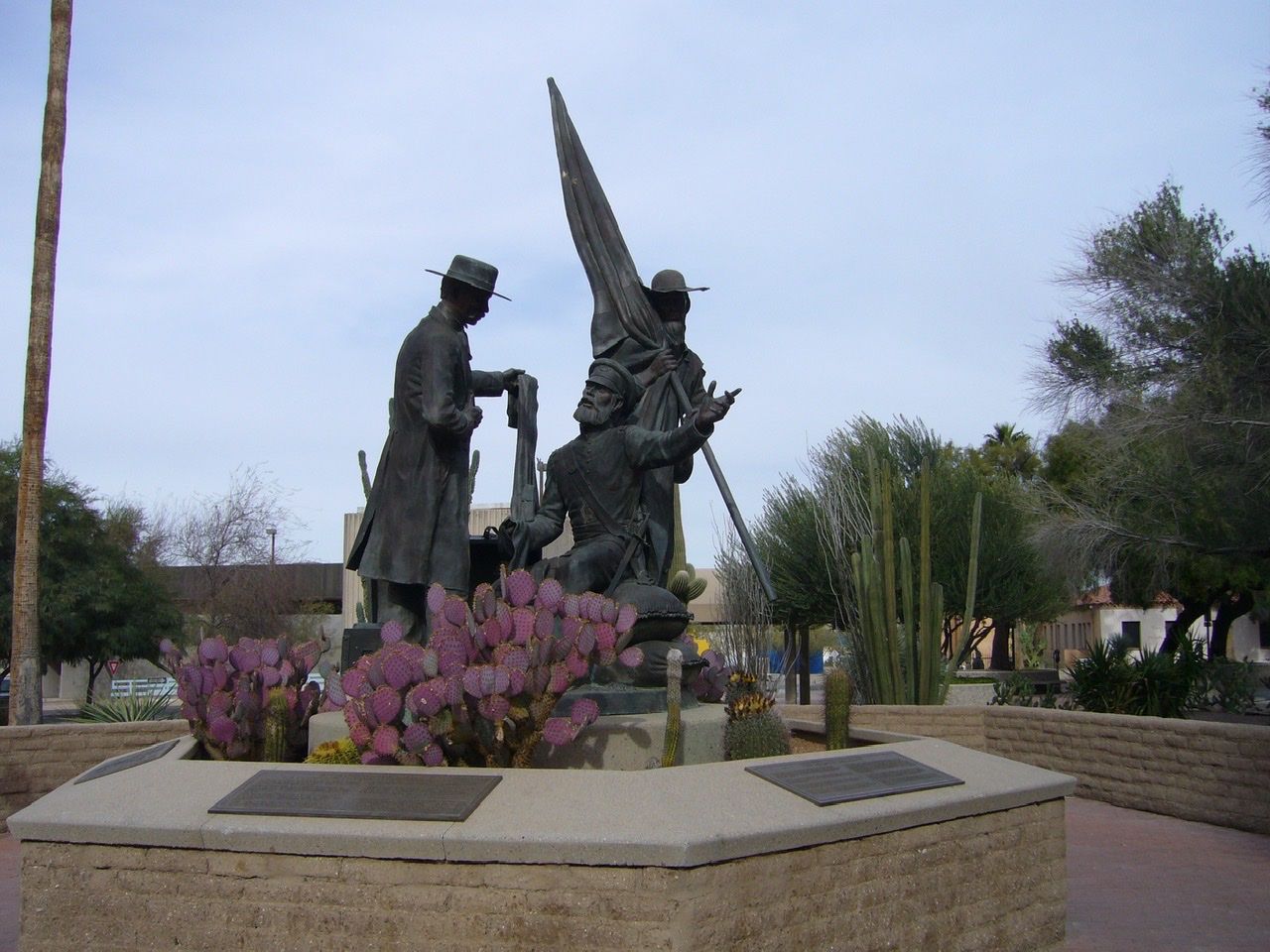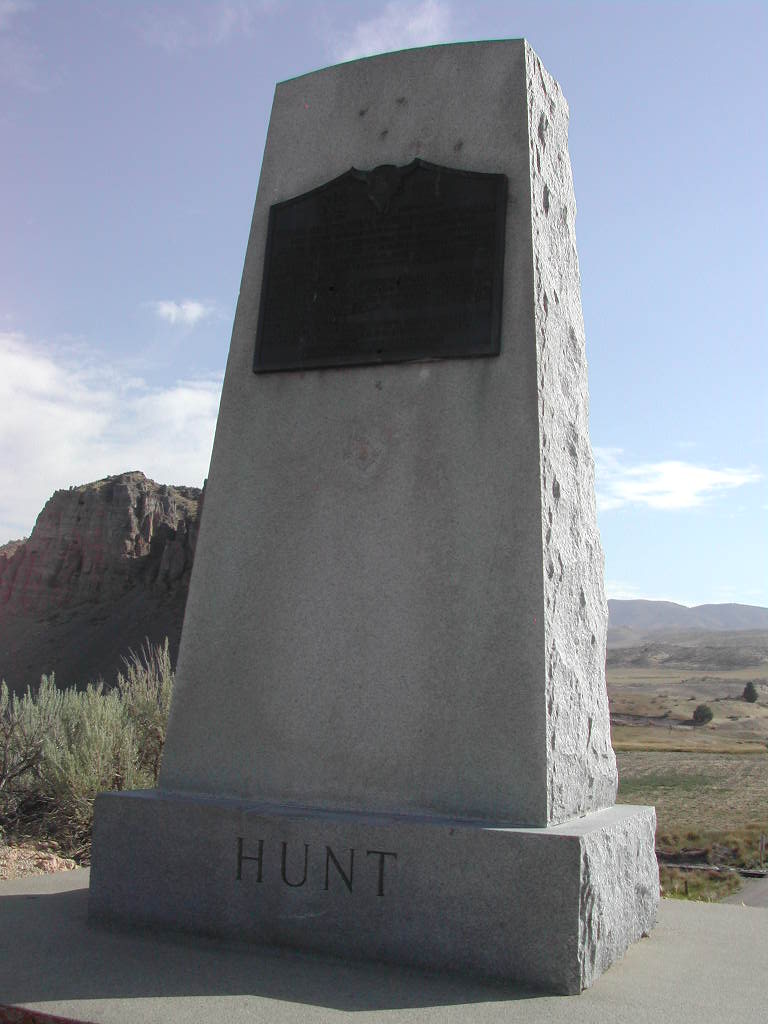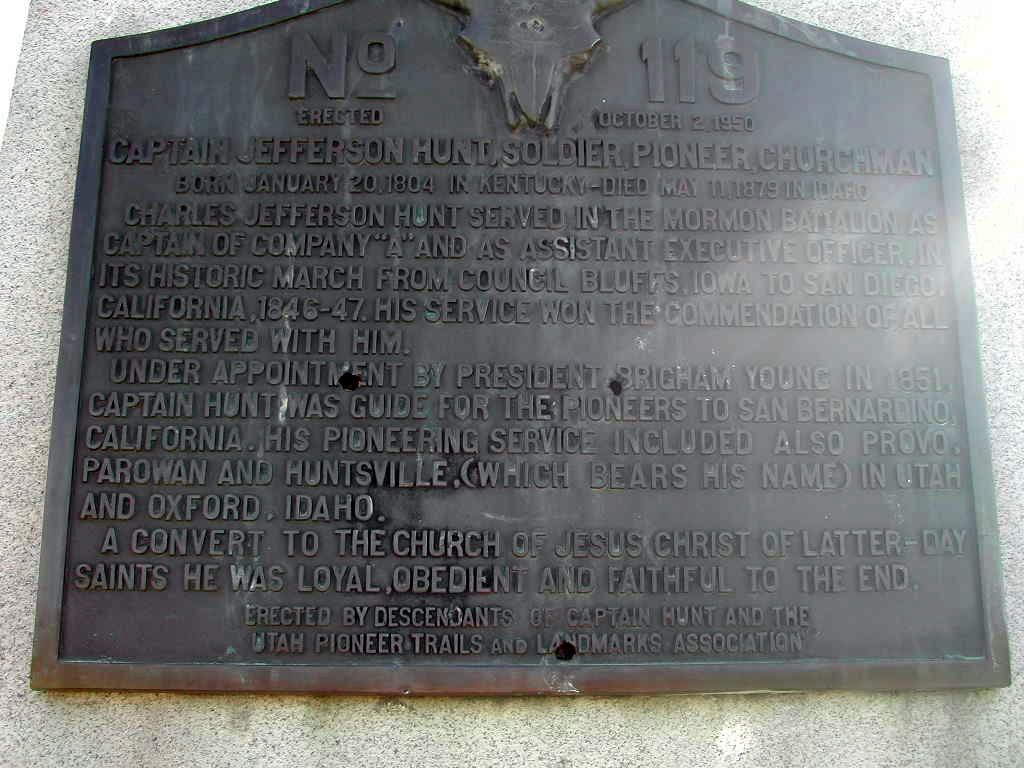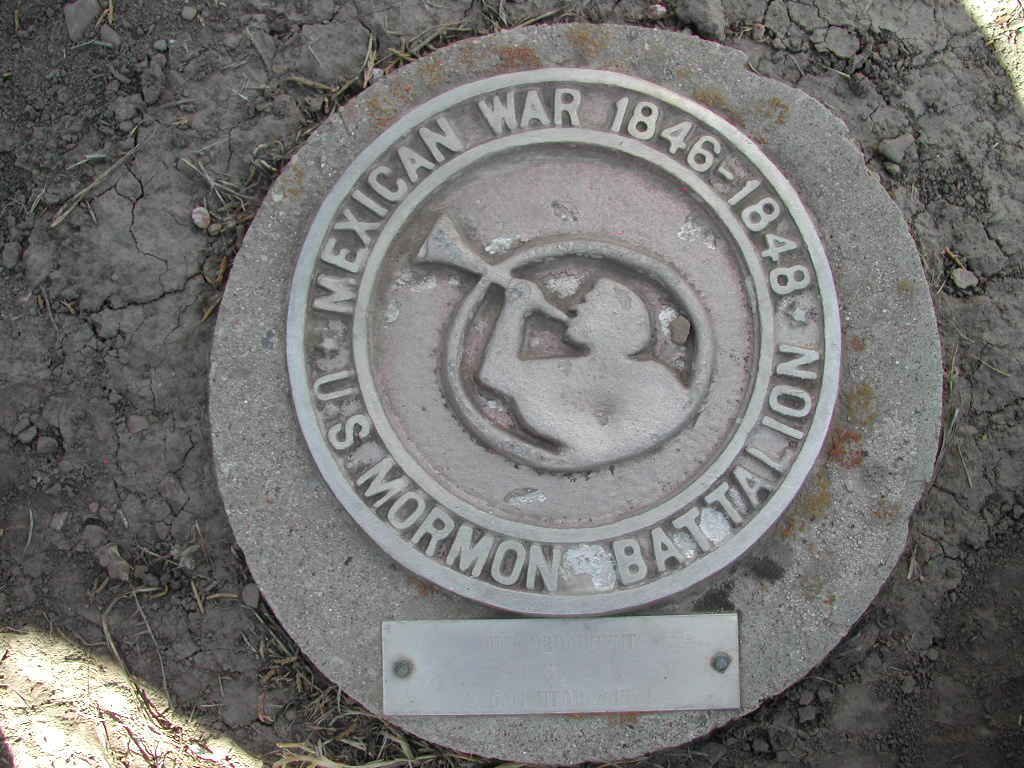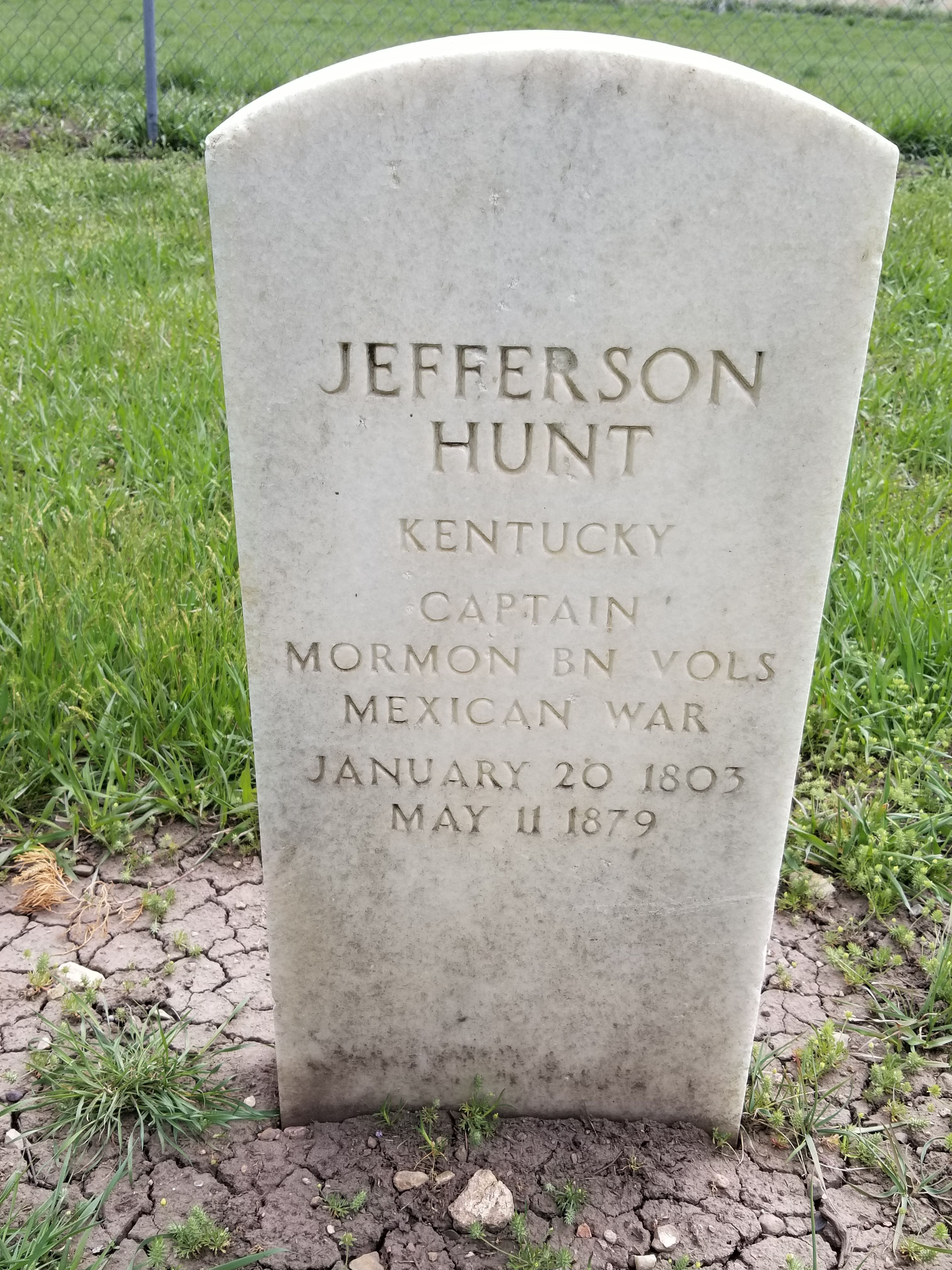Married Celia Mounts, 1 Dec 1823, Albion, Edwards, Illinois.
Children - Jefferson Hunt, Jane (Julia) Hunt, Hyrum Hunt, Harriet Hunt, John Hunt, Gilbert Hunt, Marshall Hunt, Joseph Hunt, Parley Hunt, Mary Hunt, Nancy Ann Hunt
Married Matilda Jane Nease, 7 Feb 1846, Nauvoo, Hancock, Illinois.
Children - Jannetta Hunt, Matilda Hunt, Peter Hunt, Olive Isabelle Hunt, Thomas Jefferson Hunt, James Franklin Hunt, Julia Ellen Hunt, Liberty Independence Hunt, Sophronia Elizabeth Hunt.
Tribute - This is a copy of an address given at the dedication of a monument erected at the grave of Captain Jefferson Hunt in 1950. The speaker was his great grandson, Jesse A Udall.
Seventy one years ago the mortal remains of Captain Jefferson Hunt was laid to rest near the spot where we are now standing. It is most fitting and proper that we, as his descendents and his admirers of a later generation, assemble ourselves together in this beautiful, peaceful valley on this small hill which stands as a monument provided by nature to mark the grave of this illustrious man.
One great American once said, "Those who do not remember and revere their ancestors who have done worthy deeds, are not likely to leave a posterity that will be worthy of being remembered."
We, as his posterity, hope from the depths of our souls that we will be worthy to be remembered as the descendents of this noble man, and that we will be an honor and credit to his name.
The life of Jefferson Hunt was a dedication to three great objectives: His devotion to his family; his undying faith in the cause of the restored gospel which he embraced in early manhood; and unswerving allegiance to his country.
Jefferson Hunt was born on January 22, 1804 in Bracken County, Kentucky. He was married to Celia Mounts on Christmas Day, in 1823. They were converted to the Church of Jesus Christ of Later Day Saints in the year 1834, and there is an interesting incident connected with the conversion of this couple that has come down through family tradition to us of this generation. The wife, Celia, obtained a strong testimony of the truthfulness of the gospel from Mormon elders. Jefferson, however, appeared not to be interested in the message and maintained an indifferent attitude toward the teachings that impressed his wife so much. In due course of time, with the consent of her husband, Celia applied for baptism and with the elders and a group of friends repaired to the river where the ceremony was performed while Jefferson took his yoke of oxen and went to the field to plow. The wife was naturally sorrowful because her husband would not go with her and continued in prayer in her heart that something might change his attitude. While they were assembled on the river bank, prior to the baptismal service, they saw a man running across his field swinging his hat and shouting, "hold on". Jefferson had left his ox team standing in the field and with beaming face came to apply for baptism. When he arrived at the river he said, "I cannot let Celia go ahead of me."
In due course of time they migrated with the Saints to Far West, Missouri where Jefferson was commissioned as a Major in the volunteers, later known as the Nauvoo Legion. He and his family passed through all the persecutions and drivings incident to residence of the state of Missouri, and Jefferson took part in the battle of Crooked River where apostle David W. Patten was killed. With the exodus of the Mormon people from Missouri to Illinois, Jefferson Hunt and his family went to Hancock County near Nauvoo, Illinois to live and he took part in all the stirring scenes that transpired there.
He had the great privilage of being associated with Joseph Smith, the prophet of God. He and his wife received their endowments in the Nauvoo Temple. It was then that they taught the principles of plural marriage and great grandfather took his second wife, Matilda Nease, who lived with and fared the same as his own family from that time forward. At the same time, he adopted her young orphan brother and sister, Peter and Ellen Nease.
After the martyrdom of Joseph Smith, he and his family took their places with the other pioneers who left their homes in the dead of winter in 1845 and 1846.
Colonel Thomas L. Kane described this expulsion from Nauvoo in the following language: "Carrying in mournful trains their sick and wounded, their halt and blind, they marched toward the western horizon pursuing the phantom of another home. At the top of every hill before they disappeared, they were seen looking back like banished Moors at their abandoned homes and at the glittering spires of their deserted Temple."
Perhaps the greatest opportunity for service that ever came to Jefferson Hunt presented itself in July of 1846 when Captain Allen of the U. S. Army came to Council Bluffs in Iowa with the request from the U. S. Government that the Mormons recruit a battalion of 500 volunteers to take part in the war that was then in progress with our sister republic, Mexico. In the immediate days following this request, and following the decision of Brigham Young and the Council of Twelve to provide the requested battalion, Jefferson Hunt displayed his true qualities of courage, faith, and his ability as a leader of men. President Young and the leading brethren were authorized to select the company officers for the proposed battalion.
The journal of Henry Standage records that on July 13, 1846, in the presence of Captain Allen and Colonel Kane, Captain Jefferson Hunt at 11 AM presented to Captain Allen, and called out the names of the First Company of volunteers that was later designated Company A. The journal further records that immediately thereafter at 12:40 PM the same day, President Brigham Young and the following members of the quorum of Twelve, Heber C. Kimall, Parly Pratt, Jim Tayulor, George A. Smith, Orson Hyde, Orson Pratt, Wilford Woodruff, Amasa W. Lyman Willard Richards and Ezra T. Benson, assembled under the bowery in the presence of four additional companies to make up the battalion. At that meeting, President Young said that Captain Hunt's Company was full and suggested that Jesse D. Hunter be made captain of the Second Company as Company B. He further stated that, "Those who went on this expedition would never be sorry, but would be great through all eternity." Before midnight of that day four companies had been recruited, with Brigham Young acting as the chief recruiting officer.
A day or so later Company E was recruited, and to the astonishment of their persecutors and erstwhile enemies, they were ready to march on July 20th, 1846, from Council Bluffs toward Leavenworth, Kansas. This indeed was a battalion of god's noblemen, recruited and blessed by the Lord's prophet and the Quorum of the Twelve Apostles, and sent forth with the promise that they would not have to take a life nor lose their own lives in the usual hazards of war.
It is with solemn pride that his descendants relate that he was the first Captain selected by President Young and the Quorum of the Twelve, and was the first to present his fully recruited Company to those in authority to be mustered into the service. Two of his sons, Gilbert and Marshall, also enlisted in the battalion and followed the lead of their illustrious father.
The spirituality and religious nature of great grandfather is reflected in the diaries of some of the men of the battalion who reported that Captain Hunt was chosen to represent them in giving the sermon at the funeral of Captain Allen, who died at Leavenworth, Kansas. They further relate that he spoke to the men of the battalion on several occasions when they assembled in religious worship. Sgt. Willis in writing an account of his journey back to Santa Fe where he was sent with all the sick – fifty six men in all, speaks in his memoirs of the trip of Captain Hunt and other brethren visiting them the first night out, where they administered to the sick and spoke words of comfort, and bade them Godspeed on their sad and perilous journey.
Of necessity the events connected with the march of the Mormon Battalion cannot be recited in this address, but at the time they were mustered out of service their commanding officer, Colonel George Cook, had this to say of them. "The Let. Colonel commanding congratulates the battalion on their safe arrival on the shore of the Pacific Ocean at the conclusion of their march of over 2000 miles. History may be searched in vain for an equal march of infantry. Half of it was been through wilderness where savages and wild beasts are found, or deserts, where for want of water, there is no living creature. There, with almost hopeless labor, we have dug deep wells which future travelers will enjoy. Without a guide who had traversed them, we have ventured into trackless tablelands where water was not found for several marches. Thus marching half naked and half fed and living on wild animals, we have discovered and made a road of great value to our country."
The gifted poetess, Eliza R. Snow, in later years glorified the achievements in verse, three stanzas of which I shall read as follows:
Ere the battalion started out
Upon the most important route,
Twas thus predicted by the tongue
Of President Brigham Young:
"If to God and your Country you are true,
You'll have no fighting there to do.
Was General Kearney satisfied?
Yes, more for them with martial pride
Said, "O'er the Alps Napoleon went;
But these men crossed the continent.
And thus with God Almighty's aid
The conquest and the road were made;
By which a threatening storm was staved,
And lo, the saints of God were saved."
Brigham Young summarized the achievements of the battalion in the following words: "The unseen hand of Jehovah is over this people for good, and in this thing we were able to outwit our enemies, and the snare they laid for our feet became our anchor of safety for which we rise up and call their names blessed. Truly the Mormon Battalion was a ram in the thicket as they offered themselves as sacrifice for the redemption of their brethren. The men of the battalion will be held in honorable remembrance to the latest generation and men and nations will rise up and call their names blessed."
Jefferson Hunt had rejoined his family at Salt Lake Valley after the close of his military service, and he was called by President Young in November of 1847 to return to California to purchase seed, livestock and supplies for the people of the Church. There were eighteen in the company, including his sons, Gilbert, John and Peter Nease. On this trip they suffered greatly for food, having to subsist for some days upon the flesh of their work mules, but through all such ordeals, Great Grandfather rose to the occasion and manifested the great strength of body and mind necessary for a wise father and leader of men to possess. The little boys, John and Peter, suffered greatly on this trip, being only 14 years old and not accustomed to starving. They returned to Salt Lake in May, 1848, bringing horses, mules, cattle, seed and provisions. During the following two or three years he acted as pilot and guide to companies of gold seekers going to California.
In 1851, Jefferson Hunt was called by the leaders of the Church to go with Apostle Amasa Lyman and Charles C. Rich to establish a Mormon colony in San Bernardino, California.
In the years that followed, he served his church as a member of the High Council of San Bernardino. He served his church and the State of California as a member of the legislature for six years, and he was appointed with a delegation of California lawmakers to go on a special mission to Washington D.C. Their trip from California to Independence Missouri was all accomplished on horseback.
With the coming of Johnston's Army to Utah in 1857, Jefferson Hunt responded to the call of Brigham Young, and with the other loyal members of the church they left their homes in San Bernardino and came to Utah.
His service to the State of California was recognized in tribute paid to him by the California historian Ingersol: "Captain Hunt was a man of strong character, deeply religious by nature, he believed with his heart in the divine revelations of the Mormon Doctrines. Energetic, clear sighted and indomitable in will, he was especially fitted for the leadership, which he always acquired in whatever position he was placed. Generous to a fault, his home was open to his less fortunate brethren, and he gave a helping hand to many a needy man, saint and gentile alike for he was above petty distinction. He deserves a large place in the memory of the citizens of San Bernardino for he filled a large place in the early and vital events in the history of the town and country. While he served as legislator he introduced the bill to divide Los Angeles County from San Bernardino County, and has been known since as the Father of San Bernardino County."
He pioneered Provo and Parowan, and was Iron County's first representative to the Utah Legislature.
He moved his family to Ogden Valley in 1860 where he was made the first Bishop of Huntsville, a community that was named for him. He remained there several years, magnifying his calling as a Bishop and helping to establish a strong colony in that place. A few years later he was honorably released from his Bishop's position and he and his family moved to Oxford, Idaho, where he died in June 1879.
He was the father of twenty children (twelve sons and eight daughters) most of whom grew to man and womanhood. The only living child, Jennie Hunt Lewis is here to unveil the monument. Each of his wives finished their large families with twins. The birth of Aunt Matilda's cost her life, while great grandfather was absent from home. Those who waited upon her thought she might have lived if he had been there to minister to her, for he was blessed with the gift of healing from the time he joined the church. His wife Celia, outlived him by sixteen years, during which time she lived with her children in Arizona and California.
In his later years, he was blessed with means and for years sent teams and wagons back to the states to help the poor saints migrate. He was true to the principles he had espoused and fearless in defense of the same, and of the helpless and downtrodden wherever he found them. His son in law, Mr. George Pratt, who was with great grandfather during his last illness said, "I did not realize what a great man he was till he was attacked with the deadly cancer for the second time and knew his days on earth were numbered. Then his spirit seemed to rise above the sufferings and ills of the flesh, and he discoursed on the beauties of the gospel and eternity till his soul was full of joy."
This monument will not in any sense add to the greatness and honor of the name of Jefferson Hunt. His life and works stand as a monument that far excels in grandeur and magnitude anything the hand of man can do. For us this monument is but a symbol which will indicate to future generations the high esteem in which his memory is held by his descendants.
In conclusion, let me repeat a tribute written by one of Jefferson Hunt's great grandsons, Judge Don Udall. "As a soldier and expounder of eternal truth and a servant of God, he exemplified the highest ideals of a free country, The United States of America, his beloved homeland. Obedience to command, whether from church or state, carried him through a useful life of service to mankind. He blazed new trails, and by his faith and energy the desert and the mountain became the friend of man. With such a past, it is fitting that on this rugged knoll above his grave, a monument be erected to his memory which will stand through the ages as a symbol of the vigorous life and accomplishments of a great man.
LDS Biographical Encyclopedia, Andrew Jenson, Vol. 4, p. 747
Hunt, Jefferson, a member of the Mormon Battalion and captain of Company A, was born Jan. 20, 1803, in Bracken County, Kentucky, a son of John Hunt and Martha Jenkins. He moved with his parents to Illinois, where he met and married Celia Mounts in 1823. They embraced the "Mormon" faith in 1834, and later joined the "Mormons" in Clay County, Mo., and were driven from there to Caldwell County where they shared in the persecutions of the saints at that place. During the Illinois troubles Jefferson Hunt served as a major in the Nauvoo Legion. When the call was made for the Mormons to enlist for service against Mexico, he joined the Battalion and was chosen captain of the first company. His eldest two sons also enlisted in the Battalion, his son Marshall being the youngest member (seventeen years old). The Hunt family accompanied the Battalion as far as Santa Fe. After making the march to California, Captain Hunt and son Marshall reached Salt Lake Valley in October, 1847. That fall Captain Hunt went to California with his sons and fifteen others to obtain provisions, cattle, seeds and grain. They took the southern route, reaching what is now San Bernardino, on Christmas day, 1847. With two hundred head of cattle, seeds, etc., they returned to Salt Lake, reaching the "Valley" in May, 1848. In the spring of 1849 he helped to settle Provo, remaining there until 1851, when he was called to go to California with Elder Amasa M. Lyman and Chas. C. Rich, to establish the settlement of San Bernardino. He lived there until 1857, when he was called back to Utah on account of the Johnston Army troubles. Captain Hunt served as a member of the first legislature of California and erected the first sawmill in San Bernardino County. After his return to Utah he lived in Ogden Valley, Huntsville being named in his honor. He also lived in Oxford, Idaho, where he died May 11, 1879.
See photograph of inscription placed on monument, at summit of Red Rock Pass, erected by Descendants of Captain Hunt and the Utah Pioneer Trails and Landmarks Association.
Mormon Battalion, Company A
Married Celia Mounts, 1 Dec 1823, Albion, Edwards, Illinois.
Children - Jefferson Hunt, Jane (Julia) Hunt, Hyrum Hunt, Harriet Hunt, John Hunt, Gilbert Hunt, Marshall Hunt, Joseph Hunt, Parley Hunt, Mary Hunt, Nancy Ann Hunt
Married Matilda Jane Nease, 7 Feb 1846, Nauvoo, Hancock, Illinois.
Children - Jannetta Hunt, Matilda Hunt, Peter Hunt, Olive Isabelle Hunt, Thomas Jefferson Hunt, James Franklin Hunt, Julia Ellen Hunt, Liberty Independence Hunt, Sophronia Elizabeth Hunt.
Tribute - This is a copy of an address given at the dedication of a monument erected at the grave of Captain Jefferson Hunt in 1950. The speaker was his great grandson, Jesse A Udall.
Seventy one years ago the mortal remains of Captain Jefferson Hunt was laid to rest near the spot where we are now standing. It is most fitting and proper that we, as his descendents and his admirers of a later generation, assemble ourselves together in this beautiful, peaceful valley on this small hill which stands as a monument provided by nature to mark the grave of this illustrious man.
One great American once said, "Those who do not remember and revere their ancestors who have done worthy deeds, are not likely to leave a posterity that will be worthy of being remembered."
We, as his posterity, hope from the depths of our souls that we will be worthy to be remembered as the descendents of this noble man, and that we will be an honor and credit to his name.
The life of Jefferson Hunt was a dedication to three great objectives: His devotion to his family; his undying faith in the cause of the restored gospel which he embraced in early manhood; and unswerving allegiance to his country.
Jefferson Hunt was born on January 22, 1804 in Bracken County, Kentucky. He was married to Celia Mounts on Christmas Day, in 1823. They were converted to the Church of Jesus Christ of Later Day Saints in the year 1834, and there is an interesting incident connected with the conversion of this couple that has come down through family tradition to us of this generation. The wife, Celia, obtained a strong testimony of the truthfulness of the gospel from Mormon elders. Jefferson, however, appeared not to be interested in the message and maintained an indifferent attitude toward the teachings that impressed his wife so much. In due course of time, with the consent of her husband, Celia applied for baptism and with the elders and a group of friends repaired to the river where the ceremony was performed while Jefferson took his yoke of oxen and went to the field to plow. The wife was naturally sorrowful because her husband would not go with her and continued in prayer in her heart that something might change his attitude. While they were assembled on the river bank, prior to the baptismal service, they saw a man running across his field swinging his hat and shouting, "hold on". Jefferson had left his ox team standing in the field and with beaming face came to apply for baptism. When he arrived at the river he said, "I cannot let Celia go ahead of me."
In due course of time they migrated with the Saints to Far West, Missouri where Jefferson was commissioned as a Major in the volunteers, later known as the Nauvoo Legion. He and his family passed through all the persecutions and drivings incident to residence of the state of Missouri, and Jefferson took part in the battle of Crooked River where apostle David W. Patten was killed. With the exodus of the Mormon people from Missouri to Illinois, Jefferson Hunt and his family went to Hancock County near Nauvoo, Illinois to live and he took part in all the stirring scenes that transpired there.
He had the great privilage of being associated with Joseph Smith, the prophet of God. He and his wife received their endowments in the Nauvoo Temple. It was then that they taught the principles of plural marriage and great grandfather took his second wife, Matilda Nease, who lived with and fared the same as his own family from that time forward. At the same time, he adopted her young orphan brother and sister, Peter and Ellen Nease.
After the martyrdom of Joseph Smith, he and his family took their places with the other pioneers who left their homes in the dead of winter in 1845 and 1846.
Colonel Thomas L. Kane described this expulsion from Nauvoo in the following language: "Carrying in mournful trains their sick and wounded, their halt and blind, they marched toward the western horizon pursuing the phantom of another home. At the top of every hill before they disappeared, they were seen looking back like banished Moors at their abandoned homes and at the glittering spires of their deserted Temple."
Perhaps the greatest opportunity for service that ever came to Jefferson Hunt presented itself in July of 1846 when Captain Allen of the U. S. Army came to Council Bluffs in Iowa with the request from the U. S. Government that the Mormons recruit a battalion of 500 volunteers to take part in the war that was then in progress with our sister republic, Mexico. In the immediate days following this request, and following the decision of Brigham Young and the Council of Twelve to provide the requested battalion, Jefferson Hunt displayed his true qualities of courage, faith, and his ability as a leader of men. President Young and the leading brethren were authorized to select the company officers for the proposed battalion.
The journal of Henry Standage records that on July 13, 1846, in the presence of Captain Allen and Colonel Kane, Captain Jefferson Hunt at 11 AM presented to Captain Allen, and called out the names of the First Company of volunteers that was later designated Company A. The journal further records that immediately thereafter at 12:40 PM the same day, President Brigham Young and the following members of the quorum of Twelve, Heber C. Kimall, Parly Pratt, Jim Tayulor, George A. Smith, Orson Hyde, Orson Pratt, Wilford Woodruff, Amasa W. Lyman Willard Richards and Ezra T. Benson, assembled under the bowery in the presence of four additional companies to make up the battalion. At that meeting, President Young said that Captain Hunt's Company was full and suggested that Jesse D. Hunter be made captain of the Second Company as Company B. He further stated that, "Those who went on this expedition would never be sorry, but would be great through all eternity." Before midnight of that day four companies had been recruited, with Brigham Young acting as the chief recruiting officer.
A day or so later Company E was recruited, and to the astonishment of their persecutors and erstwhile enemies, they were ready to march on July 20th, 1846, from Council Bluffs toward Leavenworth, Kansas. This indeed was a battalion of god's noblemen, recruited and blessed by the Lord's prophet and the Quorum of the Twelve Apostles, and sent forth with the promise that they would not have to take a life nor lose their own lives in the usual hazards of war.
It is with solemn pride that his descendants relate that he was the first Captain selected by President Young and the Quorum of the Twelve, and was the first to present his fully recruited Company to those in authority to be mustered into the service. Two of his sons, Gilbert and Marshall, also enlisted in the battalion and followed the lead of their illustrious father.
The spirituality and religious nature of great grandfather is reflected in the diaries of some of the men of the battalion who reported that Captain Hunt was chosen to represent them in giving the sermon at the funeral of Captain Allen, who died at Leavenworth, Kansas. They further relate that he spoke to the men of the battalion on several occasions when they assembled in religious worship. Sgt. Willis in writing an account of his journey back to Santa Fe where he was sent with all the sick – fifty six men in all, speaks in his memoirs of the trip of Captain Hunt and other brethren visiting them the first night out, where they administered to the sick and spoke words of comfort, and bade them Godspeed on their sad and perilous journey.
Of necessity the events connected with the march of the Mormon Battalion cannot be recited in this address, but at the time they were mustered out of service their commanding officer, Colonel George Cook, had this to say of them. "The Let. Colonel commanding congratulates the battalion on their safe arrival on the shore of the Pacific Ocean at the conclusion of their march of over 2000 miles. History may be searched in vain for an equal march of infantry. Half of it was been through wilderness where savages and wild beasts are found, or deserts, where for want of water, there is no living creature. There, with almost hopeless labor, we have dug deep wells which future travelers will enjoy. Without a guide who had traversed them, we have ventured into trackless tablelands where water was not found for several marches. Thus marching half naked and half fed and living on wild animals, we have discovered and made a road of great value to our country."
The gifted poetess, Eliza R. Snow, in later years glorified the achievements in verse, three stanzas of which I shall read as follows:
Ere the battalion started out
Upon the most important route,
Twas thus predicted by the tongue
Of President Brigham Young:
"If to God and your Country you are true,
You'll have no fighting there to do.
Was General Kearney satisfied?
Yes, more for them with martial pride
Said, "O'er the Alps Napoleon went;
But these men crossed the continent.
And thus with God Almighty's aid
The conquest and the road were made;
By which a threatening storm was staved,
And lo, the saints of God were saved."
Brigham Young summarized the achievements of the battalion in the following words: "The unseen hand of Jehovah is over this people for good, and in this thing we were able to outwit our enemies, and the snare they laid for our feet became our anchor of safety for which we rise up and call their names blessed. Truly the Mormon Battalion was a ram in the thicket as they offered themselves as sacrifice for the redemption of their brethren. The men of the battalion will be held in honorable remembrance to the latest generation and men and nations will rise up and call their names blessed."
Jefferson Hunt had rejoined his family at Salt Lake Valley after the close of his military service, and he was called by President Young in November of 1847 to return to California to purchase seed, livestock and supplies for the people of the Church. There were eighteen in the company, including his sons, Gilbert, John and Peter Nease. On this trip they suffered greatly for food, having to subsist for some days upon the flesh of their work mules, but through all such ordeals, Great Grandfather rose to the occasion and manifested the great strength of body and mind necessary for a wise father and leader of men to possess. The little boys, John and Peter, suffered greatly on this trip, being only 14 years old and not accustomed to starving. They returned to Salt Lake in May, 1848, bringing horses, mules, cattle, seed and provisions. During the following two or three years he acted as pilot and guide to companies of gold seekers going to California.
In 1851, Jefferson Hunt was called by the leaders of the Church to go with Apostle Amasa Lyman and Charles C. Rich to establish a Mormon colony in San Bernardino, California.
In the years that followed, he served his church as a member of the High Council of San Bernardino. He served his church and the State of California as a member of the legislature for six years, and he was appointed with a delegation of California lawmakers to go on a special mission to Washington D.C. Their trip from California to Independence Missouri was all accomplished on horseback.
With the coming of Johnston's Army to Utah in 1857, Jefferson Hunt responded to the call of Brigham Young, and with the other loyal members of the church they left their homes in San Bernardino and came to Utah.
His service to the State of California was recognized in tribute paid to him by the California historian Ingersol: "Captain Hunt was a man of strong character, deeply religious by nature, he believed with his heart in the divine revelations of the Mormon Doctrines. Energetic, clear sighted and indomitable in will, he was especially fitted for the leadership, which he always acquired in whatever position he was placed. Generous to a fault, his home was open to his less fortunate brethren, and he gave a helping hand to many a needy man, saint and gentile alike for he was above petty distinction. He deserves a large place in the memory of the citizens of San Bernardino for he filled a large place in the early and vital events in the history of the town and country. While he served as legislator he introduced the bill to divide Los Angeles County from San Bernardino County, and has been known since as the Father of San Bernardino County."
He pioneered Provo and Parowan, and was Iron County's first representative to the Utah Legislature.
He moved his family to Ogden Valley in 1860 where he was made the first Bishop of Huntsville, a community that was named for him. He remained there several years, magnifying his calling as a Bishop and helping to establish a strong colony in that place. A few years later he was honorably released from his Bishop's position and he and his family moved to Oxford, Idaho, where he died in June 1879.
He was the father of twenty children (twelve sons and eight daughters) most of whom grew to man and womanhood. The only living child, Jennie Hunt Lewis is here to unveil the monument. Each of his wives finished their large families with twins. The birth of Aunt Matilda's cost her life, while great grandfather was absent from home. Those who waited upon her thought she might have lived if he had been there to minister to her, for he was blessed with the gift of healing from the time he joined the church. His wife Celia, outlived him by sixteen years, during which time she lived with her children in Arizona and California.
In his later years, he was blessed with means and for years sent teams and wagons back to the states to help the poor saints migrate. He was true to the principles he had espoused and fearless in defense of the same, and of the helpless and downtrodden wherever he found them. His son in law, Mr. George Pratt, who was with great grandfather during his last illness said, "I did not realize what a great man he was till he was attacked with the deadly cancer for the second time and knew his days on earth were numbered. Then his spirit seemed to rise above the sufferings and ills of the flesh, and he discoursed on the beauties of the gospel and eternity till his soul was full of joy."
This monument will not in any sense add to the greatness and honor of the name of Jefferson Hunt. His life and works stand as a monument that far excels in grandeur and magnitude anything the hand of man can do. For us this monument is but a symbol which will indicate to future generations the high esteem in which his memory is held by his descendants.
In conclusion, let me repeat a tribute written by one of Jefferson Hunt's great grandsons, Judge Don Udall. "As a soldier and expounder of eternal truth and a servant of God, he exemplified the highest ideals of a free country, The United States of America, his beloved homeland. Obedience to command, whether from church or state, carried him through a useful life of service to mankind. He blazed new trails, and by his faith and energy the desert and the mountain became the friend of man. With such a past, it is fitting that on this rugged knoll above his grave, a monument be erected to his memory which will stand through the ages as a symbol of the vigorous life and accomplishments of a great man.
LDS Biographical Encyclopedia, Andrew Jenson, Vol. 4, p. 747
Hunt, Jefferson, a member of the Mormon Battalion and captain of Company A, was born Jan. 20, 1803, in Bracken County, Kentucky, a son of John Hunt and Martha Jenkins. He moved with his parents to Illinois, where he met and married Celia Mounts in 1823. They embraced the "Mormon" faith in 1834, and later joined the "Mormons" in Clay County, Mo., and were driven from there to Caldwell County where they shared in the persecutions of the saints at that place. During the Illinois troubles Jefferson Hunt served as a major in the Nauvoo Legion. When the call was made for the Mormons to enlist for service against Mexico, he joined the Battalion and was chosen captain of the first company. His eldest two sons also enlisted in the Battalion, his son Marshall being the youngest member (seventeen years old). The Hunt family accompanied the Battalion as far as Santa Fe. After making the march to California, Captain Hunt and son Marshall reached Salt Lake Valley in October, 1847. That fall Captain Hunt went to California with his sons and fifteen others to obtain provisions, cattle, seeds and grain. They took the southern route, reaching what is now San Bernardino, on Christmas day, 1847. With two hundred head of cattle, seeds, etc., they returned to Salt Lake, reaching the "Valley" in May, 1848. In the spring of 1849 he helped to settle Provo, remaining there until 1851, when he was called to go to California with Elder Amasa M. Lyman and Chas. C. Rich, to establish the settlement of San Bernardino. He lived there until 1857, when he was called back to Utah on account of the Johnston Army troubles. Captain Hunt served as a member of the first legislature of California and erected the first sawmill in San Bernardino County. After his return to Utah he lived in Ogden Valley, Huntsville being named in his honor. He also lived in Oxford, Idaho, where he died May 11, 1879.
See photograph of inscription placed on monument, at summit of Red Rock Pass, erected by Descendants of Captain Hunt and the Utah Pioneer Trails and Landmarks Association.
Mormon Battalion, Company A
Family Members
-
![]()
Corp Gilbert Hunt
1825–1858
-
![]()
Nancy Ann Hunt Daley
1827–1920
-
![]()
Marshall Hunt
1829–1915
-
![]()
Jane "Julia" Hunt Stoddard
1831–1899
-
![]()
John Hunt
1833–1917
-
![]()
Harriet Hunt Mayfield
1835–1918
-
![]()
Joseph Hunt
1837–1916
-
![]()
Hyrum Hunt
1840–1880
-
Parley Hunt
1845–1847
-
![]()
Mary Hunt Black
1845–1930
-
![]()
Sophronia Elizabeth Hunt Coffin
1849–1942
-
![]()
Julia Ellen Hunt Barger
1852–1932
-
![]()
Olive Isabelle Hunt Pratt
1854–1942
-
![]()
Thomas Jefferson "James" Hunt
1856–1885
-
![]()
James Franklin "Frank" Hunt
1858–1917
-
![]()
Liberty Independence Hunt
1860–1934
-
![]()
Peter Hunt
1862–1905
-
![]()
Janette Hunt
1865–1865
-
![]()
Jennie H. Hunt Lewis
1865–1958
Advertisement
Records on Ancestry
Sponsored by Ancestry
Advertisement
